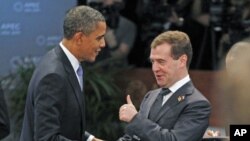Most experts agree relations between the United States and Russia are good. The two countries still have differences, but they increasingly work together on a wide range of issues.
President Barack Obama has made better relations with Russia a cornerstone of his foreign policy. Experts say the so-called “reset” in relations that Obama launched shortly after coming into office almost three years ago has generated important achievements.
Angela Stent, a Russia expert at Georgetown University, said the highlight was the ratification by both countries of the New START treaty reducing long-range nuclear weapons.
“We can still destroy each other - it makes no sense to have all those warheads. The Cold War is over, so we’ve drastically cut down the number of warheads and we are going to cut them down further. So I think it was very important to accomplish that,” said Stent.
Stent and others say another achievement was the agreement allowing U.S. military transports to transit through Russia into Afghanistan. Given the frayed relationship between the United States and Pakistan, Stent says that supply route is crucial for the conduct of the war.
Moscow also has supported stronger United Nations sanctions against Iran and has canceled the delivery of S-300 anti-aircraft missiles to Tehran. In addition, the Russian government did not oppose a no-fly zone over Libya.
But Stent says the two sides still disagree on U.S. plans for a missile defense system in Europe.
“We have explained to them - our government [has], many, many times - this system has to do with concerns about the Iranians acquiring nuclear weapons, about the North Koreans, about countries that could threaten us all. It’s not aimed at Russia,” said Stent.
She said the “reset” in relations has been built on the relationship between President Obama and his Russian counterpart, Dmitry Medvedev.
“They’ve met many times, they’ve talked much more. They spent a lot time together either virtually or really. President Obama met with Prime Minister [Vladimir] Putin once in July 2009 and it was a difficult meeting. Putin has a lot of resentment against the United States, against what he sees as failed promises from the Bush administration, and he certainly discussed those.”
Former National Security Adviser General Brent Scowcroft looks at Putin’s criticism.
“Putin’s basic complaint was at the end of the Cold War, 'When we - the Russians - were flat on our backs, you took advantage of it. You pushed the borders of NATO right up to include parts of the old Soviet Union. You denounced the ABM [Anti-Ballistic Missile] treaty. You did a lot of things because we were weak. And now we are strong and you can’t do that anymore,'” said Scowcroft.
In a few months, Russian citizens go to the polls to elect a new president to succeed Medvedev. The odds-on favorite to win is Putin. Many experts wonder whether the good relationship between Washington and Moscow will continue, or whether there will be a harsher tone from the Kremlin, given Putin’s previous history.




